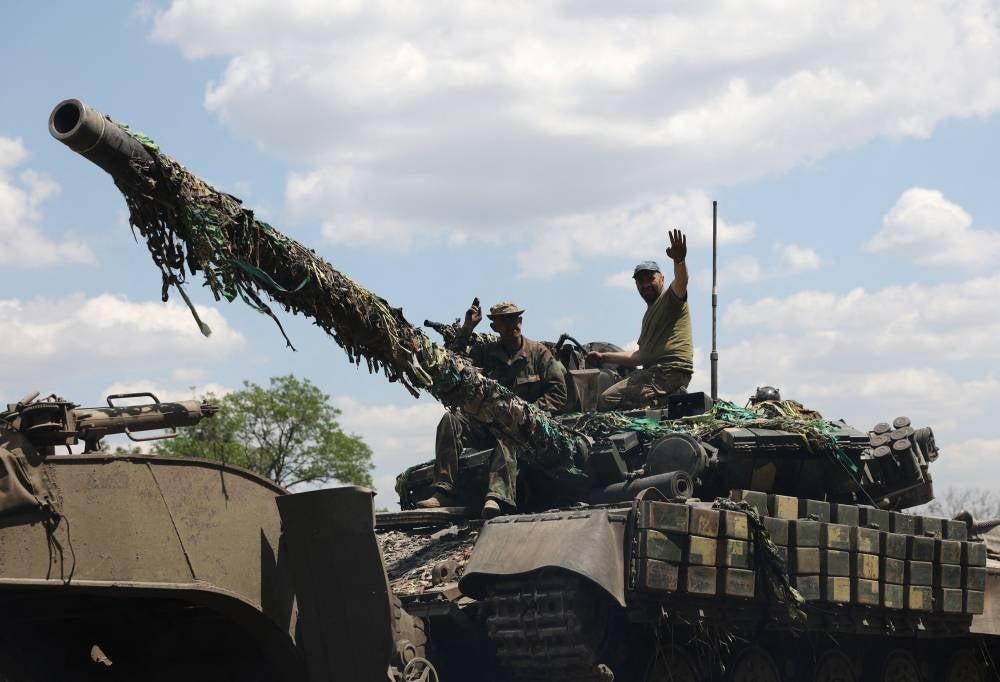Evacuations as Russia advances in Ukraine's Donbas

SLOVIANSK, UKRAINE - The evacuation of desperate civilians from Sloviansk pressed on Wednesday as Russian troops pushed towards the eastern Ukrainian city in their campaign to control the Donbas region.
Sloviansk has been hit by heavy bombardment as Russian forces advance westwards on day 133 of the invasion.
"Twenty years of work; everything is lost. No more income, no more wealth," Yevgen Oleksandrovych, 66, told AFP as he surveyed the site of his car parts shop, destroyed in strikes on Tuesday.
AFP journalists saw rockets slam into Sloviansk's marketplace and surrounding streets, with firefighters scrambling to put out blazes.
Around a third of the market appeared to have been destroyed, with locals inspecting what was left among the charred ruins.
The remaining part of the market was functioning, with a trickle of shoppers buying fruit and vegetables.
- Sloviansk mayor defiant -
"I will sell it out and that's it, and we will stay home. We have basements, we will hide there," said 72-year-old greengrocer Galyna Vasyliivna.
"What we can do? We have nowhere to go, nobody needs us." Mayor Vadym Lyakh said around 23,000 people out of a population of 110,000 were still in Sloviansk but claimed Russia had been unable to surround the city.
"Since the beginning of hostilities, 17 residents of the community have died, 67 have been injured," he said.
"Evacuation is ongoing. We take people out every day." Many of the evacuees were taken by bus to the city of Dnipro, further west.
"The city is well fortified. Russia does not manage to advance to the city," the mayor said.
Vitaliy, a plumber, said his wife and their daughter, who is six months pregnant, were evacuated from Sloviansk on Wednesday.
"I am afraid for my wife," he told AFP. "Here, after what happened yesterday, they hit the city centre.
"I sent my wife (away), and I have no more choice: tomorrow I will join the army." The eastern Donbas is mainly comprised of the Lugansk region, which Russian forces have almost entirely captured, and the Donetsk region to its southwest -- the focus of Moscow's attack and the location of Sloviansk.
The fall of Lysychansk in Lugansk on Sunday, a week after the Ukrainian army also retreated from the neighbouring city of Severodonetsk, has freed up Russian troops.
Donetsk governor Pavlo Kyrylenko said Russian forces killed five civilians and injured 21 in the region on Tuesday.
The governor of Lugansk, Sergiy Gayday, insisted Russia did not control the entire Lugansk region, saying: "Fighting still keeps going in two villages."
- Irish PM sees 'evil' -
Irish Prime Minister Micheal Martin was in Ukraine Wednesday to voice Dublin's solidarity. He visited Borodyanka and Bucha outside Kyiv, two towns that have become symbols of the alleged war crimes committed by Russian soldiers.
"In the 21st century, to see such evil -- very, very difficult to comprehend," he said before talks with Ukrainian President Volodymyr Zelensky.
In his evening address Zelensky hailed new heavy Western artillery for boosting Ukraine's firepower.
"The weapons we have received from our partners have started working very powerfully. Their accuracy is exactly as it should be," he said.
"Our defenders inflict notable blows on warehouses and other points which are important for the logistics of the occupiers. And this significantly reduces the offensive potential of the Russian army."
- Russia toughens laws -
The EU on Wednesday set out a harder focus on energy given Russia's war in Ukraine.
"We need to prepare for further disruptions of gas supply, even a complete cut-off from Russia," European Commission chief Ursula von der Leyen told the European Parliament.
The EU has launched a 300-billion-euro ($310-billion) plan to wean itself off Russian fossil fuel supplies.
Russia's parliament on Wednesday introduced harsh prison terms for acting against national security, and for "confidential" cooperation with foreigners and helping them to act against Russia's interests.
Rights activists fear the new legislation will be used to snuff out any last vestiges of dissent.
Lawmakers also approved legislation to create a patriotic youth movement, in a move reminiscent of Soviet-era youth organisations.
Meanwhile former Russian president Dmitry Medvedev invoked the possibility of nuclear war if the International Criminal Court moves to punish Moscow for alleged crimes in Ukraine.
"The idea to punish a country that has the largest nuclear arsenal is absurd," said Medvedev, a close ally of President Vladimir Putin.
"And potentially creates a threat to the existence of mankind." - Nicolas Garcia / AFP









